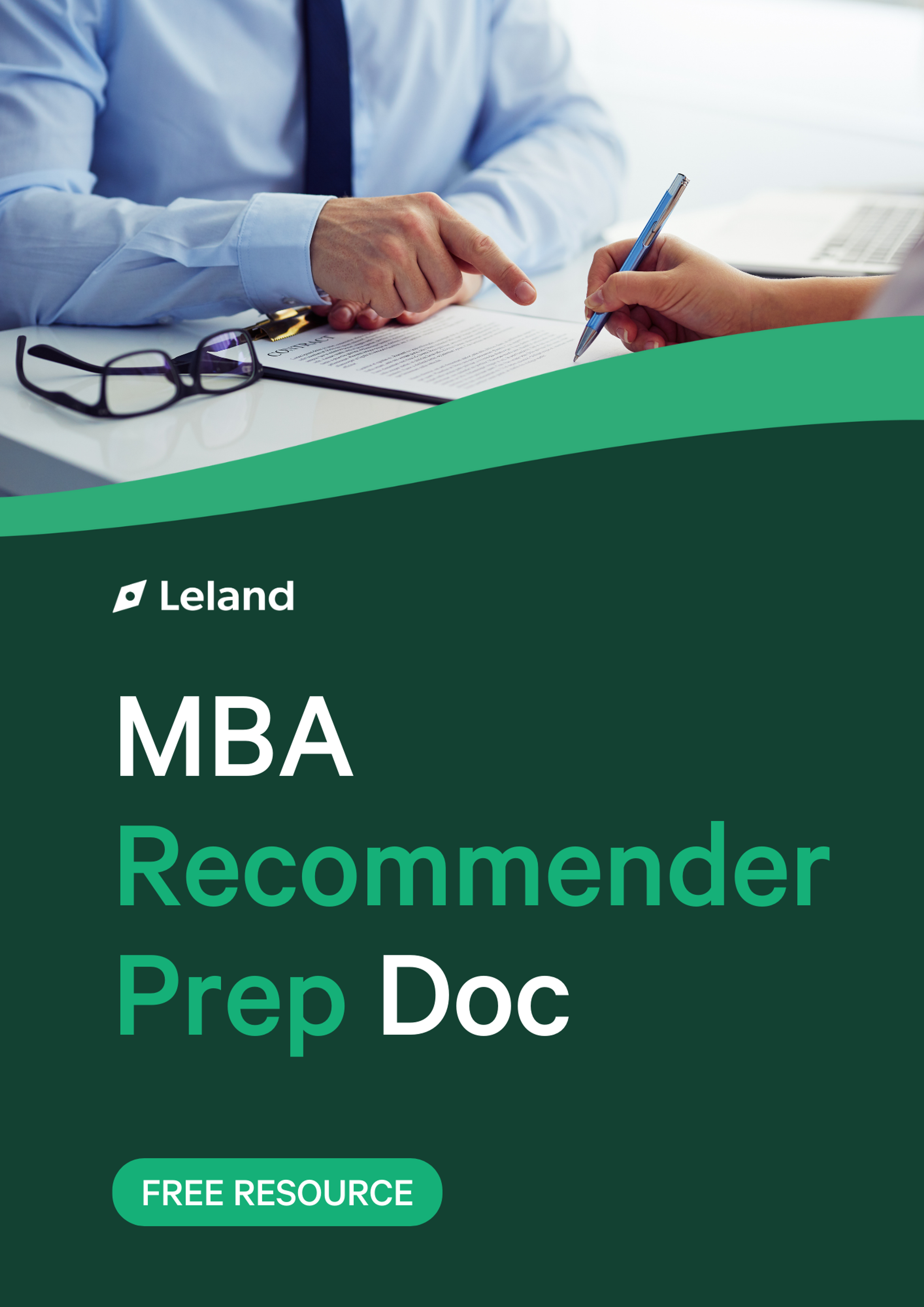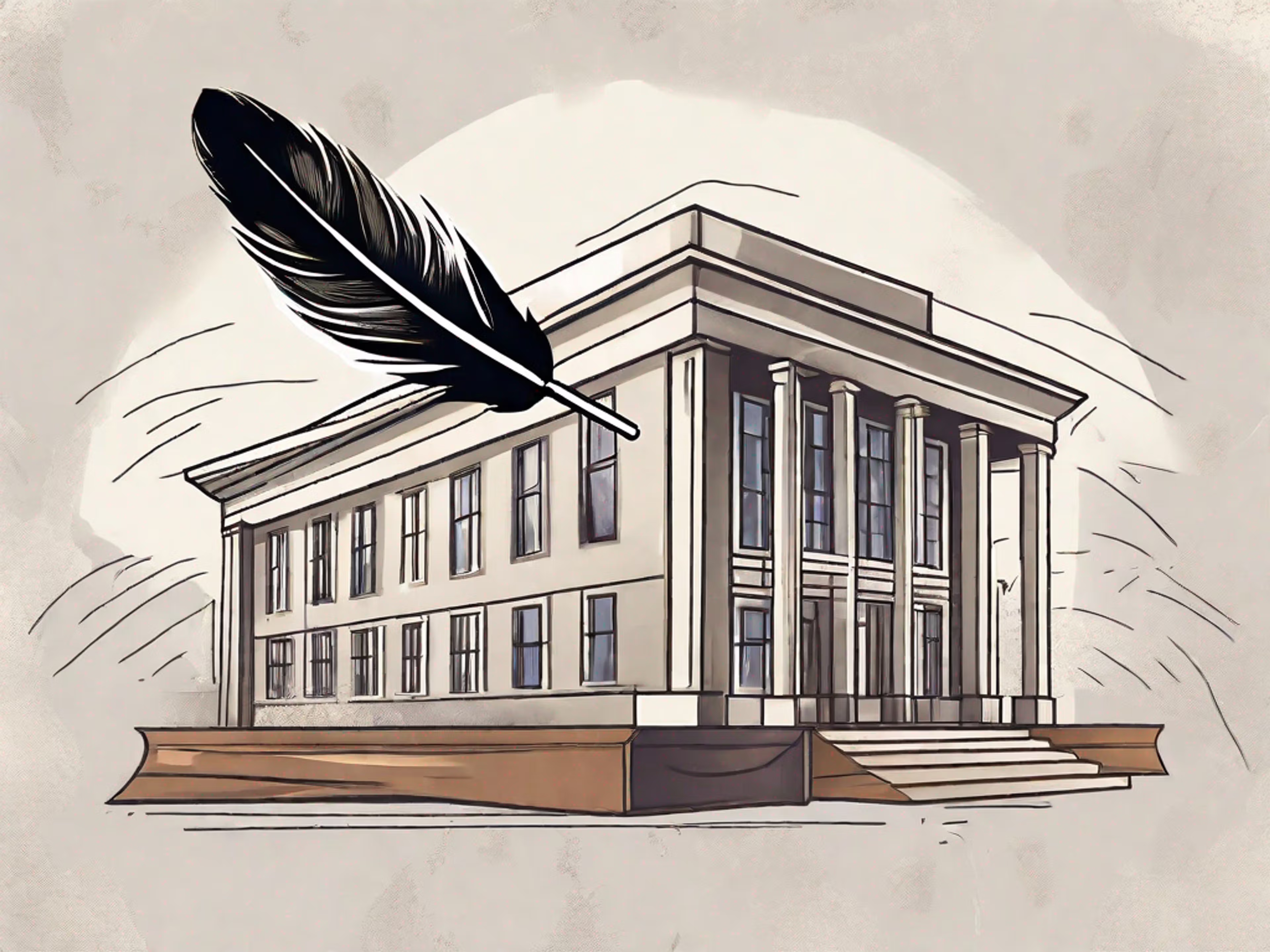How to Secure a Stellar MBA Recommendation Letter
A professional MBA admissions coach outlines her top tips for securing the best possible letters of recommendation from your recommenders, based on years of experience helping applicants get admitted to the best business schools in the world.

By Melanie E.
🚀 100+ M7 MBA Admits | Ex-McKinsey | Columbia MBA & Essay Expert
Posted March 6, 2025

Table of Contents
Free Event

Featuring Melanie E.
How to Get a Head Start on Your MBA Application
Starting Wednesday, April 16
10:00 PM UTC · 60 minutes

Featuring Melanie E.
Letters of recommendation play a pivotal role in the MBA application process. While the applicant’s essays, resume, test scores, GPA, and other materials provided are from the applicant’s perspective, the letter of recommendation offers an external validation of the applicant’s character and capabilities.
Since applicants lack direct influence over these letters, they often find this aspect of the application daunting. The absence of control can leave them feeling uncertain, as they entrust this crucial component to others. However, there are proactive steps you can take to ensure your recommenders deliver strong letters without having to write them yourself.
While you don’t want to control everything that the recommenders say, you can guide them to focus on themes and traits that strengthen your overall application. Most recommenders appreciate this guidance as it not only simplifies the letter-writing process but also helps them support the applicant effectively.

How to Identify Ideal Recommenders
Choosing the right individuals to write your MBA letters of recommendation is crucial. The influence of a well-chosen recommender can significantly enhance your application, providing admissions committees with a deeper understanding of your professional capabilities and personal character.
Professional Relationships
When selecting professional recommenders, aim for a direct or skip-level supervisor who can attest to your top performance. Ideally, these should be individuals who would rank you within their top 5-10% of employees. If your current supervisor is not an option, consider previous supervisors or senior colleagues within your organization who can provide detailed accounts of your professional interactions.
It's important to avoid choosing recommenders based solely on their title or status. A heartfelt, detailed recommendation from a direct supervisor often carries more weight than a generic letter from a high-ranking executive who has little day-to-day interaction with you.
While it may be tempting, family members, subordinates, or acquaintances without direct professional interaction should not be considered.

How to Request an MBA Letter of Recommendation
Now that you've chosen your recommenders and understand the importance of recommendation letters, it's time to approach them for their support.
So, how can you prepare your recommender to write an outstanding recommendation? Here are three essential steps to effectively asking for a letter of recommendation:
Make Your Initial Request Personal and Impactful
Recognize that your recommender may be approached by multiple MBA applicants. To stand out, start with a thoughtful and personal conversation. Consider scheduling a face-to-face meeting at least three months before your application deadlines to discuss the letter's details. During this meeting, explain why you value their perspective and express gratitude for their support in this significant step of your career. Share your enthusiasm for pursuing an MBA and articulate how their endorsement could positively influence your application.
Provide Necessary Information
Help your recommender by providing essential materials through your Recommender Prep Doc that you would like them to highlight. The more context and information you provide, the easier it will be for your recommender to craft a thorough and effective letter.

MBA Recommender Prep Doc
Download our free recommender prep doc with a template and example to help secure the strongest possible LORs.
Set Clear Expectations
It's crucial to establish clear expectations to ensure the letter of recommendation is completed on time and meets the program's requirements. Clearly communicate the submission deadlines and any specific guidelines provided by the MBA program. This clarity not only helps your recommender understand their role but also allows them to make an informed decision about their ability to fulfill your request. Be prepared for the possibility of a "no" and have alternative options in mind.

Remember to maintain regular communication with your recommenders, gently reminding them of deadlines and offering assistance with any additional information they may need.
For further insights on requesting letters of recommendation, read How to Ask for Letters of Recommendation—An Expert Guide.
How to Secure MBA Recommendation Letters
Once you have selected your recommenders, it is imperative to actively engage in the recommendation process. This involvement goes beyond merely ensuring the submission of the recommendation letters; it involves equipping recommenders with the necessary tools and information to write compelling and personalized endorsements.
My top tip to ensure your recommenders are prepared to submit exceptional recommendation letters with ease is to create a guide—known as a Recommender Prep Doc—for each recommender. See our free download above to get a head start on yours.
This written guide should provide helpful and specific suggestions and will help you have as much influence over the writing process as possible. Recommenders will appreciate the guidance, which streamlines their workload.
Here are four essential elements to incorporate into your recommender prep packet:
1. Include Your MBA-Specific Resume
Ensure your guide features a copy of your MBA-specific resume. Unlike conventional professional resumes, MBA resumes highlight distinct facets tailored for graduate admissions. This document serves as a valuable reference, helping your recommender recall crucial details such as dates of promotions, specific job titles, and other pertinent career milestones essential for crafting a compelling letter of recommendation.
To learn more about how to craft a strong MBA-specific resume read here.
2. Share your MBA Story and Goals
Provide your recommender with insights into your short-term and long-term post-MBA aspirations, as well as the motivations driving these goals. Including this information in your guide ensures that your recommender understands your perspective and can align any narrative about your career with other components of your application. Additionally, sharing your goals can help your recommender articulate why you are a good fit for your future goals, reinforcing to the admissions committee your potential for future success.
Your MBA narrative, encompassing your journey and aspirations, is pivotal in shaping a cohesive application. Aligning your recommendation letters with these themes strengthens your overall candidacy.
3. Organize Questions by Topic
Include in your guide a categorized list of recommendation questions from all the schools you are applying to. For instance, categorize questions under topics like "Constructive Feedback," which often includes prompts such as, “Please describe the most impactful piece of constructive feedback you have provided to the applicant.”
By grouping questions this way, your recommender can easily see how to craft coherent responses for each topic and adjust the word count as needed for different schools. This approach minimizes their workload, reduces overwhelm, and typically results in more focused and effective letters.
The underlying aim here is to simplify the process for your recommenders. By removing logistical hurdles, you empower them to concentrate on writing compelling recommendation letters. This approach also ensures they have ample time to prepare, avoiding last-minute rushes before deadlines.
Your upfront preparation demonstrates your commitment to the process, signaling to recommenders that you value their input, which in turn encourages them to invest more thought and effort into their letters.
4. Create Demonstrative Suggestions
The most important piece of your guide will be demonstrative suggestions. You don’t need to tell your recommenders exactly what to write, but you can provide specific examples of stories, characteristics, and feedback that they can pull from to supplement their thoughts.
Before approaching your recommenders, invest time in reflecting on your strengths, areas for growth, and overall application strategy. A strong, cohesive narrative is crucial to a powerful application and you’ll want your letter writers to supplement, not diminish, that theme.
- Hard Skills: Such as analytical rigor, financial modeling, etc.
- Soft Skills: Including verbal and written communication, persuasion, etc.
- Leadership: Demonstrated through mentoring, teaching, managing, coaching, etc.
- Community Engagement: Involvement in extracurriculars, ERGs, volunteering, etc.
- Track Record of Success: Highlighting consistent promotions, increased responsibilities, strong performance reviews, awards, etc.
- Comparison to Others: Positive evaluations relative to peers in tenure, title, cohort, or team.
Read more at: What is MBA Application Strategy?

Final Words
Remember that your recommendation letters are an integral part of your application and should be consistent with all of your other components, highlighting the same story, personal brand, strengths, and opportunities. You should pick recommenders who know you well and who will be open to receiving your coaching and recommendation guide.
For an even more detailed guide, check out my full MBA Recommendation Letter Template in Leland+.
Whenever you're ready, there are 3 ways I can help you:
- Check out my helpful MBA and career content on Leland+.
- Book Hourly Coaching with me.
- Schedule a consultation with me to discuss a Comprehensive School Package with Unlimited Hours!
Good luck with your application!
FAQs - Secure an Outstanding MBA Letter of Recommendation
What are the key elements of a standout recommendation letter?
- A stellar recommendation letter should include specific examples and details that highlight why the individual is an exceptional candidate. Use precise and strong adjectives rather than vague or clichéd language. Consider what the letter’s reader might need to know that isn’t evident from the resume or application, and include unique insights or details about the candidate.
Can I write my recommendation letter for the recommender to sign?
- While some recommenders might ask you to draft the letter, it's not advisable. Admissions committees can often spot self-written letters, which may harm your application. Instead, offer to provide detailed information about your accomplishments to assist your recommender.
How far in advance should I ask for a recommendation letter?
- Aim to ask for a recommendation at least three months before your application deadlines. This gives your recommender ample time to write a thoughtful letter and allows for any unforeseen delays.
What should I do if a potential recommender declines to write the letter?
- Respect their decision and be understanding. Have alternative recommenders in mind and approach them promptly to ensure you have sufficient time before deadlines.
Is it acceptable to follow up with my recommenders after asking for a letter?
- Yes, regular follow-ups are recommended to ensure your recommenders stay on track. Be respectful of their time and offer assistance if they require additional information.
How should I thank my recommender?
- Send a personalized thank-you note or email expressing sincere appreciation for their support and the effort they put into writing your recommendation letter. A handwritten note can add a personal touch and show your gratitude in a meaningful way.
About the Author
Melanie is a proven MBA Admissions Coach, Executive Coach, and Life Coach with 17 years of experience in strategy, operations, and coaching. She pairs her ex-McKinsey consulting toolkit with her sharp communication skills and EQ. This rich blend of skills and a multi-hyphenate background including acting, fashion, and painting allow Melanie to be an excellent coach with an eye for detail and heart in her clients’ unique stories.
Melanie has been featured in Forbes, NBC, ABC, CBS, Business Insider, TEDx, and more. She has worked with prominent corporate clients including Google, Meta, IBM, and Morgan Stanley; as well as individuals such as business leaders, influencers, and Olympic athletes.
Melanie holds an MBA from Columbia University and a BS from Cornell University. She currently lives in Los Angeles (while remaining a New Yorker at heart), and enjoys creative pursuits in her free time.
To work with Melanie on your MBA applications, book a free intro call on her coach profile here.

Written by Melanie
5.0
(47)
Melanie is an Executive Coach & Admissions Coach with 17 years of experience across strategy, operations, and coaching. A former McKinsey consultant, she is a member of the Forbes Council and has been featured on NBC, ABC, CBS, Business Insider, TEDx, and more. Melanie has worked with prominent corporate clients including Google, KKR, IBM, and Morgan Stanley; as well as individuals such as business leaders, influencers, and Olympic athletes. Today, Melanie manages Espeland Enterprises, her coaching firm. She offers expertise in MBA Admissions and Executive Coaching. Melanie holds an MBA from Columbia University and a BS from Cornell University. She currently lives in Los Angeles (while remaining a New Yorker at heart), and enjoys creative pursuits in her free time. You're welcome to learn more about Melanie by watching her videos: --Melanie's TV appearances: https://www.youtube.com/watch?v=U8gMHwQ9sEw --Melanie's TED Talk: https://www.youtube.com/watch?v=PXPBtO8RX58&t
Melanie has helped clients get into organizations like:
Stanford Graduate School of Business
Harvard Business School
The Wharton School (UPenn)
Kellogg School of Management (Northwestern)
Columbia Business School


















